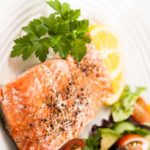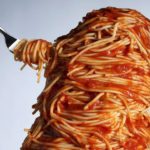Beware of Carbo-Loading, Eat More Fat, Be Sure to Eat Breakfast, and Eat Frequently Throughout the Day
Book excerpt from Healthy Running Step by Step Robert Forster, PT
Our knowledge of food and diet is rapidly growing and changing. Some of the old rules that were long accepted as gospel have been turned on their head in recent years, such as “carbo-loading”-ingesting a great pile of carbohydrates the night before a big workout or an event to “pack” the muscles with glycogen fuel. It has long been a tradition in the endurance world. But it’s wrong. Here’s the correct eating strategy:1. Avoid processed carbs.
They prevent use of fats, spike insulin, and cause inflammation.C Processed carbohydrates include bread, pasta, rice, crackers, baked goods, and other sweets. (See “Wean Yourself Off Wheat: For Many Reasons, You’re Better Off without Your Daily Bread” on pages 94-95 on the particular problems with wheat.) Processed carbs are dangerous for three reasons:- Carbs stop fat use. Carbohydrates in your diet are counterproductive in your effort to improve fat utilization. If you put carbs in your tank, your body will reach for them as fuel before it reaches for fat to make energy for workouts and daily living.
- Carbs spike your insulin and put you to sleep. Example: If you eat a big bowl of pasta, the large insulin spike opens the cell windows and transports the carbs into the cells quickly, removing them from the bloodstream. That makes you sleepy or causes you to crave a sugar fix or caffeine to pick you up.
- Carbs create inflammation in the gut, keeping you chronically inflamed and bloated. Inflammation in the body produces excessive cholesterol. You will learn that saturated fat is not killing us; it’s the carbohydrates that do that.
2. Don’t eat carbs alone.
Dilute and delay the quick absorption of processed carbs and sugars by always eating them with a protein-such as peanut butter on rice crackers. Eat fruit only after meals containing protein. This mixture is one reason why the Mediterranean diet is so effective: It includes combinations of carbs and protein eaten together.3. Don’t fear fat, love it.
Recent research has exposed the big lie propagated by medical and nutritional science over the last 50 years: that dietary fat is making us fat, ruining our heart and blood vessels, and destroying our health. In fact, the opposite is true. Processed whole grains, the very food that we’ve been told is at the core of a healthy diet, is what is killing us. Fat is far from the widow maker and heart-attack-waiting-to-happen that it’s been made out to be for the past 40 years. It’s an essential nutrient and a valuable fuel for athletes who have trained their bodies to burn it. This view is increasingly supported by research and many people in the know, the latest being an esteemed cardiologist writing in the October 22, 2013, edition of the BMJ (formerly the British Medical Journal). Aseem Malhotra, MD, a British interventional cardiology specialist at Croydon University Hospital in London, wrote, “Let’s bust the myth of saturated fat’s role in heart disease.” He says statistics suggest that decades of swearing off red meat, whole milk, and eggs has not only failed to reduce heart disease, but has “paradoxically increased our cardiovascular risks and that the real culprit are the sugars and processed carbs.”4. Don’t skip breakfast.
Overnight, your metabolism goes down to idle, burning relatively few calories. When you wake up, you must jack up your metabolism with breakfast and start your engine burning calories right away. This will help you become leaner and perform better.5. Follow the 2-hour rule.
Eat every 2 hours. If you don’t eat from breakfast until lunch, your insulin levels die down and so does your calorie burn. Between meals eat a balanced snack of 100 to 200 calories to keep insulin levels stable, which will prevent you from overeating at your next meal. Good choices include nuts, seeds, cottage cheese, tuna in oil, or yogurt. Never eat carbs alone for a snack. Break out the healthy snacks at 10 AM, 2 PM, and 2 hours after dinner.6. Periodize your diet.
Maximize the effect of each training phase, you must alter the mix of nutrients to match your nutrition to the physiological demands of your workouts. Your daily meals and snacks and your post-workout recovery nutrition will vary as you progress through each phase of the Periodization schedule. If you are struggling with your athletic and weight management goals in spite of hard work year after year, it is time to train with science! Take the guess-work our of your nutrition and training program with the help of PHASE IV Science.To learn how you can incorporate Nutrition Optimization in your training, contact us for a complimentary consult with a member of our Nutrition staff. 310-582-8212 or email info@phase-iv.net.








